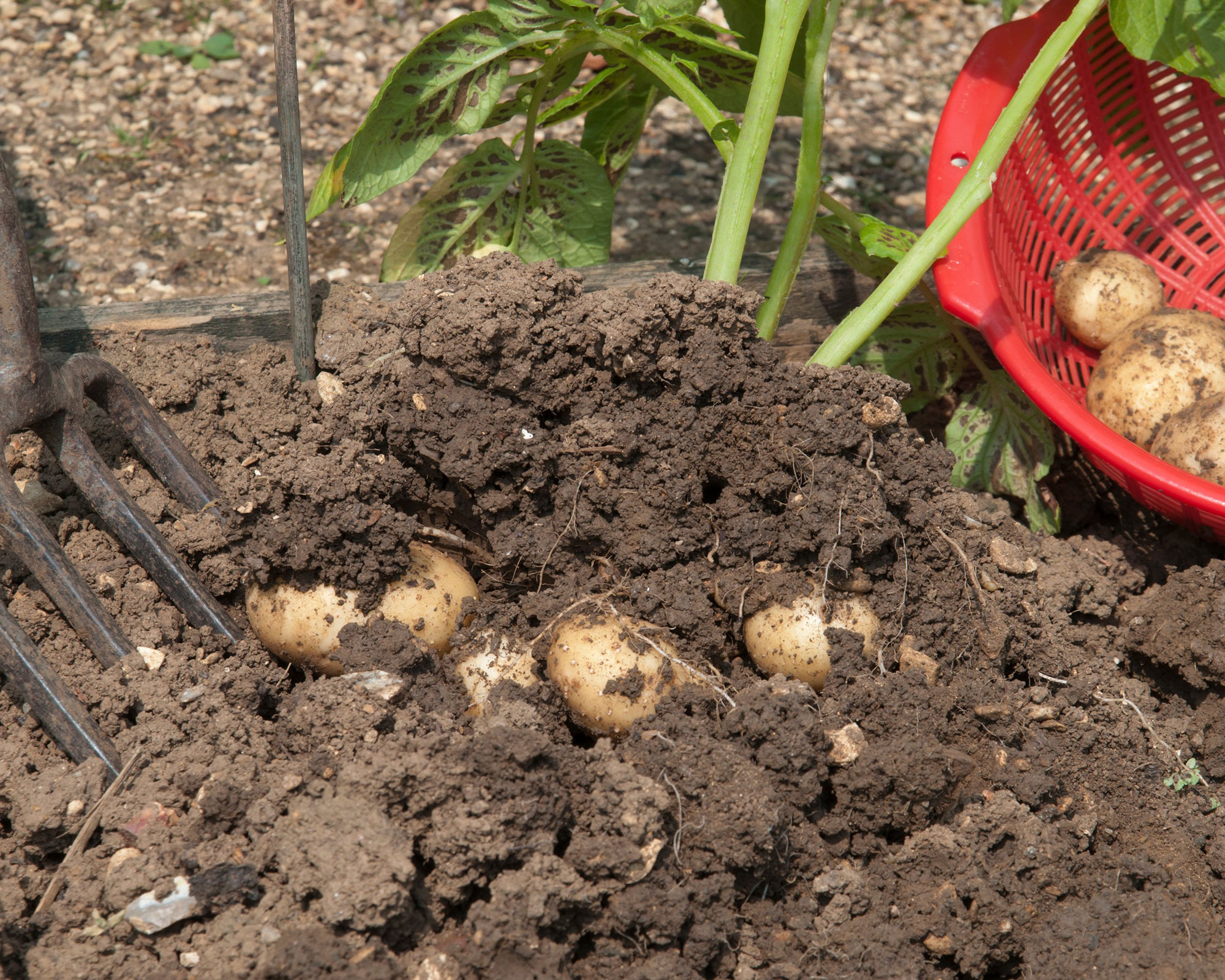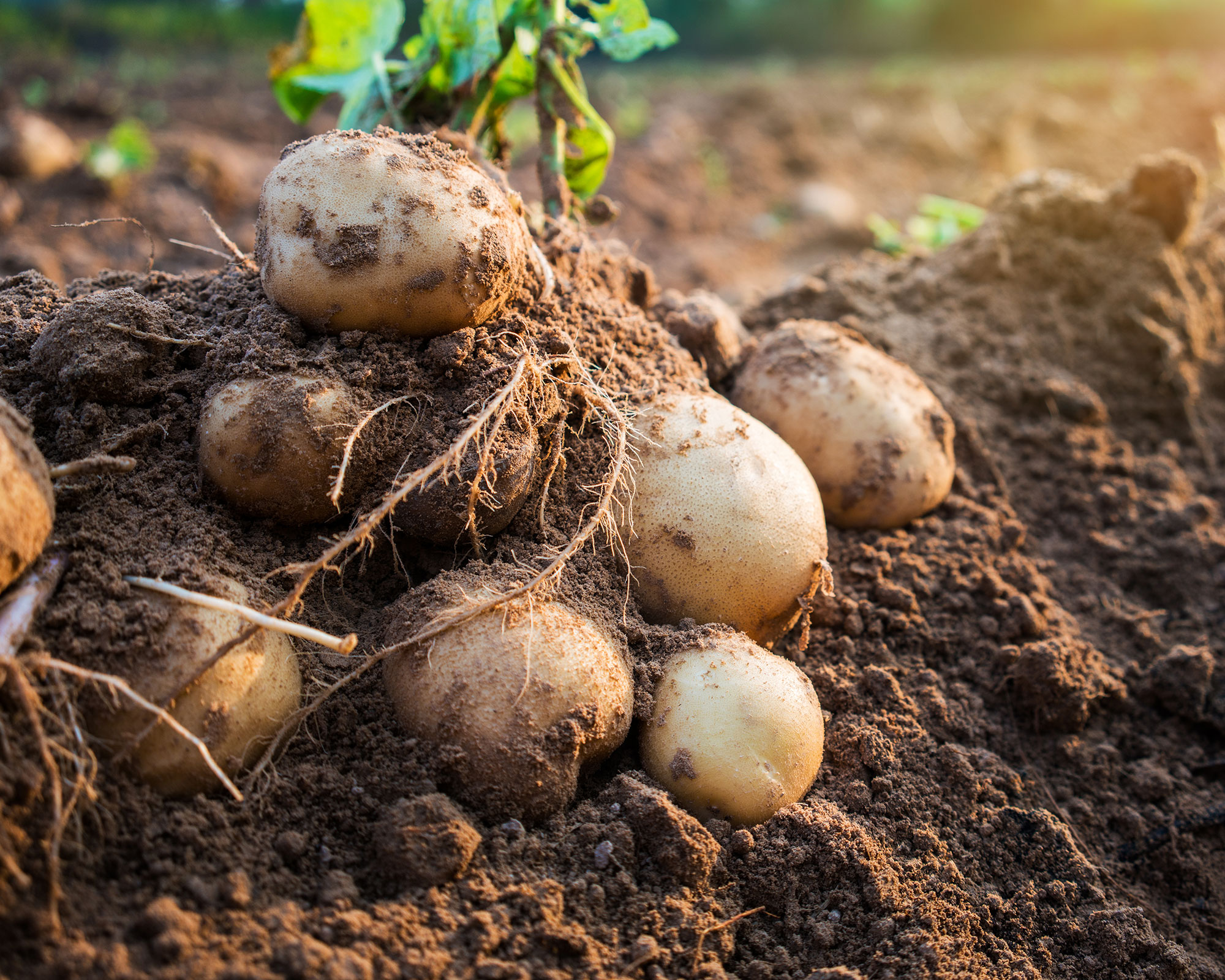When to harvest potatoes – for a tasty crop
Discover when to harvest potatoes, both earlies and storage, to ensure the tastiest crop from summer onwards


Design expertise in your inbox – from inspiring decorating ideas and beautiful celebrity homes to practical gardening advice and shopping round-ups.
You are now subscribed
Your newsletter sign-up was successful
Want to add more newsletters?

Twice a week
Homes&Gardens
The ultimate interior design resource from the world's leading experts - discover inspiring decorating ideas, color scheming know-how, garden inspiration and shopping expertise.

Once a week
In The Loop from Next In Design
Members of the Next in Design Circle will receive In the Loop, our weekly email filled with trade news, names to know and spotlight moments. Together we’re building a brighter design future.

Twice a week
Cucina
Whether you’re passionate about hosting exquisite dinners, experimenting with culinary trends, or perfecting your kitchen's design with timeless elegance and innovative functionality, this newsletter is here to inspire
When you harvest potatoes depends on the type of potato you want to produce: early or storage (maincrop). Ideally, plant a bed of each so that you can harvest new potatoes in early summer for salads and barbecues, and larger potatoes for roasts and baking in the fall.
As a general rule, if you are growing potatoes that are an early variety, you can tell when to harvest them by watching the flowers open or the buds drop. This will usually be around mid-June or early July. Once harvested, they are ready to eat, and don't store well. For best results, harvest them on the day you want to eat them.
Maincrop potatoes are usually ready to harvest between August and October. The advice is to wait until the foliage turns yellow, before cutting it off and waiting 10 days before harvesting. These potatoes store well, so you can harvest them all at once.
These dates will vary a little depending on various factors; below, we go into more detail about when to harvest potatoes so you can get the best results.
When to harvest potatoes

Potatoes are categorized into three groups: first earlies, second earlies and maincrop.
First earlies are your 'new' potatoes; these are the quickest to grow and will be ready 10 weeks after planting when the potato is flowering.
‘Because of the small size of first early potatoes, these potatoes grow well in containers or potato sacks,’ points out Francesco Ponziani, Horticulturist at RHS Garden Harlow Carr.
Design expertise in your inbox – from inspiring decorating ideas and beautiful celebrity homes to practical gardening advice and shopping round-ups.
This means harvesting first early potatoes in June or July. The plant will still be flowering, and the potatoes a couple of inches across. Don't feel you have to harvest potatoes all at the same time; allowing the plant to continue to grow its potatoes while removing just enough to eat with your fingers is a great way to ensure continued access to fresh produce.
Second earlies include slightly larger and more interesting-tasting potatoes such as ‘Jazzy’, ‘Kestrel’ and ‘Ratte’. These will be ready 13 weeks after planting when the plant is still flowering.
This means harvesting these potatoes in July and August; as with first earlies, they're best harvested on the day you want to eat them. As with earlies, these potatoes are best harvested by hand.
Maincrop potatoes include potato staples such as ‘Maris Piper’ and ‘Desiree’, perfect for roasting, baking and mashing. These will be ready 20 weeks after planting, from August until after the first frosts in October. By then, the potato's foliage will have died off, so cut it off, wait for 10 days to let the skins thicken, then harvest the entire plant, using a garden fork. The potatoes harvested will vary in size and store well, though let them dry out before storage.
How long after the plants flower can I harvest potatoes?
You can harvest potatoes, depending on their variety, from around nine weeks to 13 weeks after planting potatoes, when the flowers appear. At this point, these 'new' potatoes will be only around 2 inches wide.
If, however, you are harvesting maincrop potatoes, you will need to leave them in the ground longer – around three months. By then, the flowers will have dropped and the plant's foliage will have yellowed and even dried a little.
A sign to watch for is a mound forming around the potato plant's stem – this is where nice, sizeable, juicy potatoes are pushing the earth upwards above them.
If you are planning to store your maincrop potatoes, you will want to leave them a few hours to dry out before storing.
How can I shorten potato harvesting time?
You can't shorten harvest time with potatoes that are already in the ground any more than we have advised above, but you can shorten growing times with chitting next season.
‘Chitting is a method of preparing tubers for planting which breaks their dormancy artificially and initiates growth,’ explains Francesco. ‘Reducing the time in which potatoes are ready to harvest.’
How to harvest potatoes
To harvest early potatoes, you can use your hands to remove just what you need; ideally, feed the potato afterwards to encourage more growth. If you are growing earlies in a container and want to harvest the potatoes all at once, you can turn them out into a larger container or on to a patio so that you can pick out the potatoes with ease.
To harvest maincrop or storage potatoes, first cut the plants to the ground and wait for 10 days to allow the skins to thicken. Then wait for a dry day, and dig up the whole plant with a fork or spade, being careful not to spear any potatoes as you go.
‘Make sure that you reject any green potatoes as these can be poisonous,’ advises Kate Turner, Gardening Guru at Miracle-Gro.
Brush off the soil, allow to dry for an hour outdoors and store potatoes somewhere dry.

Lucy Searle has written about interiors, property and gardens since 1990, working her way around the interiors departments of women's magazines before switching to interiors-only titles in the mid-nineties. She was Associate Editor on Ideal Home, and Launch Editor of 4Homes magazine, before moving into digital in 2007, launching Channel 4's flagship website, Channel4.com/4homes. In 2018, Lucy took on the role of Global Editor in Chief for Realhomes.com, taking the site from a small magazine add-on to a global success. She was asked to repeat that success at Homes & Gardens, where she has also taken on the editorship of the magazine.